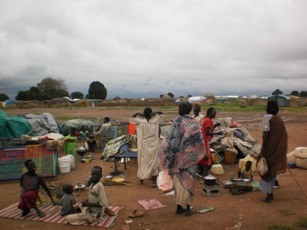Over 20,000 returnees stranded at South Sudan border
By Julius N. Uma
September 6, 2011 (JUBA) – More than 20,000 returnees on their way to South Sudan remain stranded in border towns, without adequate food and with no idea when they might be able to move on, a US-based organisation’s 4 October report says.

The influx of South Sudanese citizens came in the aftermath of South Sudan’s independence in July this year.
According to a team from RI that visited Renk, humanitarian conditions for these returnees are alarming. They called upon the Government of South Sudan (GoSS) and international humanitarian agencies to intervene.
“These South Sudanese came to Renk thinking they would only be staying for a few days at most before continuing their journey home,” Peter Orr, a senior advocate for RI, said.
He added, “Instead, they are languishing in temporary structures, struggling to keep out of the alternating drenching rain and scorching sun. People told us they are dying of hunger.”
RI says the South Sudan Relief and Rehabilitation Commission, a government agency in the area, remains overwhelmed.
“The serious concerns over the lack of food demand attention from the World Food Programme, which currently is not operating in Renk. The United Nations Office for the Coordination of Humanitarian Affairs (OCHA) should also send a team to Renk as soon as possible,” the report reads in part.
Currently, RI added, the burden of coordinating the aid effort is on the International Organization for Migration (IOM), an organisation it believes should be left to focus on its core responsibility of transporting the returnees.
Due to difficult living conditions on the border, returnees have reportedly been forced to sell their belongings in order to buy food in the local market, where prices are high due to increased demand and a blockade on cross-border trade imposed by Khartoum.
“And the problem threatens to get worse. The way station just north of the border in Kosti was designed to hold 800 people. It is now overflowing with 13,000 returnees, and may soon be closed to new arrivals. If that happens, even more people will end up in Renk. And yet there is no contingency plan for this very real risk,” the report adds.
Addressing a media conference on Wednesday, Joseph Lual Acuil, South Sudan’s minister for humanitarian affairs and disaster management duly acknowledged the current repatriation challenges, citing numerous logistical difficulties.
“We still have thousands of southerners camped at Renk awaiting transportation to their various locations and the process is under way. The local resources that we were able to mobilize have been overstretched,” Acuil told journalists in Juba, South Sudan’s capital.
(ST)
